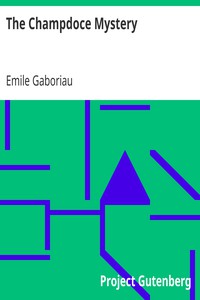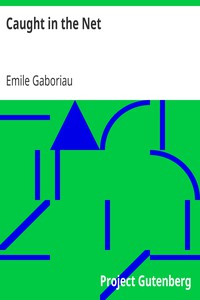The Champdoce Mystery, Emile Gaboriau [ebooks that read to you .TXT] 📗

- Author: Emile Gaboriau
Book online «The Champdoce Mystery, Emile Gaboriau [ebooks that read to you .TXT] 📗». Author Emile Gaboriau
“Yes,” answered she faintly; “I was almost frightened to death.”
“I do not think that he would do you any harm,” remarked Octave.
“No matter; make him go away;” and as she spoke she struck at him with her parasol. But the dog never for a moment supposed that Diana was in earnest, and, supposing that she intended to play with him, as she had often done before, began to gambol round her, barking joyously the whole time.
“But this dog evidently knows you, Diana,” observed the Viscount.
“Know me? Impossible!” and as she spoke Bruno ran up and licked her hand. “If he does, his memory is better than mine; at any rate, I am half afraid of him. Come, Octave, let us go.”
They turned away, and Octave would have forgotten all about the occurrence had not Bruno, delighted at having found an old acquaintance, persisted in following them.
“This is strange,” exclaimed the Viscount, “very strange indeed. Look here, my man,” said he, addressing a peasant, who was engaged in clipping a hedge by the roadside, “do you know whose dog this is?”
“Yes, my lord, it belongs to the young Duke of Champdoce.”
“Of course,” answered Diana, “I have often seen the dog at the Widow Rouleau’s, and have occasionally given it a piece of bread. He was always with Francoise, who ran off with that man Daumon. Oh, yes, I know him now; here, Bruno, here!”
The dog rushed to her, and, stooping down, she caressed him, thus hoping to conceal her tell-tale face.
Octave drew his wife’s arm within his without another word. A strange feeling of doubt had arisen in his mind. Diana, too, was much disturbed, and abused herself mentally for having been so weak and cowardly. Why had she not at once confessed that she knew the dog? Had she said at once, “Why, that is Bruno, the Duke of Champdoce’s dog,” her husband would have thought no more about the matter; but her own folly had made much of a merely trivial incident.
Ever since that fatal walk the Viscount’s manner appeared to have changed, and more than once Diana fancied that she caught a look of suspicion in his eyes. How could she best manage to make him forget this unlucky event? She saw that for the rest of her life she must affect a terror of dogs; and, for the future, whenever she saw one, she uttered a little cry of alarm, and insisted upon all Octave’s being chained up. But for all this she lived in a perfect atmosphere of suspicion and anxiety, while the very ground upon which she walked seemed to have been mined beneath her feet. Her sole wish now was to fly from Mussidan, and leave Bevron and its environs, she cared not for what spot. It has been first arranged that immediately after the marriage they should make a short tour; but in spite of this, they still lingered at Mussidan; and all that Diana could do was to keep this previous determination before her husband, without making any direct attack.
The blow came at last, and was more unexpected and terrible than she had anticipated. On the afternoon of the 26th of October, as Diana was gazing from her window, an excited crowd rushed into the courtyard of the Chateau, followed by four men bearing a litter covered with a sheet, under which could be distinguished the rigid limbs of a dead body, while a cruel crimson stain upon one side of the white covering too plainly showed that some one had met with a violent death.
The hideous sight froze Diana with terror, and it was impossible for her to leave the window or quit the object on the litter, which seemed to have a terrible fascination for her. That very morning her husband, accompanied by his friend the Baron de Clinchain, Montlouis, and a servant named Ludovic, had gone out for a day’s shooting. It was evident that something had happened to one of the party; which of them could it be? The doubt was not of very long duration; for at that moment her husband entered the courtyard, supported by M. de Clinchain and Ludovic. His face was deadly pale, and he seemed scarcely able to drag one leg after the other. The dead man therefore must be Montlouis. She need no longer plot and scheme for the dismissal of the secretary, for his tongue had been silenced for ever.
A ray of comfort dawned in Diana’s heart at this idea, and gave her the strength to descend the staircase. Halfway down she met M. de Clinchain, who was ascending. He seized her by the arm, and said hoarsely,—
“Go back, madame, go back!”
“But tell me what has happened.”
“A terrible calamity. Go back to your room, I beg of you. Your husband will be here presently;” and, as Octave appeared, he absolutely pushed her into her own room.
Octave followed, and, extending his arms, pressed his wife closely to his breast, bursting as he did so into a passion of sobs.
“Ah!” cried M. de Clinchain joyously, “he is saved. See, he weeps; I had feared for his reason.”
After many questions and incoherent answers, Madame de Mussidan at last arrived at the fact that her husband had shot Montlouis by accident. Diana believed this story, but it was far from the truth. Montlouis had met his death at her hands quite as much as the Duke de Champdoce had done. He had died because he was the possessor of a fatal secret.
This was what had really occurred. After lunch, Octave, who had drunk rather freely, began to rally Montlouis regarding his mysterious movements, and to assert that some woman must be at the bottom of them. At first Montlouis joined in the laugh; but at length M. de Mussidan became too personal in remarks regarding the woman his secretary loved, and Montlouis responded angrily. This influenced his master’s temper, and he went on to say that he could no longer permit such doings, and he reproached his secretary for risking his present and future for a woman who was worthy neither of love nor respect, and who was notoriously unfaithful to him. Montlouis heard this last taunt with compressed lips and a deep cloud upon his brow.
“Do not utter a word more, Count,” said he; “I forbid you to do so.”
He spoke so disrespectfully that Octave was about to strike him, but Montlouis drew back and avoided the blow; but he was so intoxicated with fury that this last insult roused him beyond all bounds.
“By what right do you speak thus,” said he, “who have married another man’s mistress? It well becomes you to talk of woman’s virtue, when your wife is a—”
He had no time to finish his sentence, for Octave, levelling his gun, shot him through the heart.
M. de Mussidan kept these facts from his wife because he really loved her, and true love is capable of any extreme; and he felt that, however strong the cause might be, he should never have the courage to separate from Diana; that whatever she might do in the future, or had already done in the past, he could not choose but forgive her.
Acquitted of all blame, thanks to Clinchain’s and Ludovic’s evidence—for





Comments (0)